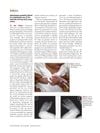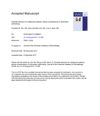20 citations,
December 1994 in “Fertility and sterility” Flutamide combined with a low-dose birth control pill effectively reduces excessive hair growth in women with polycystic ovarian disease.
 3 citations,
December 1997 in “Pediatric Clinics of North America”
3 citations,
December 1997 in “Pediatric Clinics of North America” Pediatricians should advise sexually active teens on safe sex and STD prevention, and discuss contraceptive options and their side effects.
 December 2023 in “Frontiers in endocrinology”
December 2023 in “Frontiers in endocrinology” Excess androgens may cause PCOS, not just be a symptom.
[object Object]  October 2023 in “Journal of the Endocrine Society”
October 2023 in “Journal of the Endocrine Society” Losing weight and taking birth control pills can greatly improve severe male hormone excess in women with PCOS.
 August 2022 in “Journal of Contemporary medical practice”
August 2022 in “Journal of Contemporary medical practice” Combining Traditional Chinese Medicine and Western medicine can improve symptoms, hormone levels, and pregnancy outcomes in Polycystic Ovary Syndrome patients, but more research is needed.
 December 2022 in “International Journal of Current Science Research and Review”
December 2022 in “International Journal of Current Science Research and Review” Polycystic Ovary Syndrome (PCOS) is a common but often undiagnosed disorder in women that can cause irregular periods, infertility, and other symptoms, and can be managed with lifestyle changes, medication, and sometimes surgery.
[object Object]  December 2015 in “Kosin Medical Journal”
December 2015 in “Kosin Medical Journal” PCOS treatment should address both symptoms and metabolic risks, starting with lifestyle changes and possibly including medication.
June 2015 in “Obstetrics, gynaecology and reproductive medicine” Hirsutism, excessive hair growth in women, is often caused by polycystic ovarian syndrome and is treated by targeting the cause, lifestyle changes, and medication.
 February 2009 in “Springer eBooks”
February 2009 in “Springer eBooks” Hyperpigmentation is common in pregnancy and may not fully fade after birth; melasma, also frequent, can persist but has limited treatment options during pregnancy.
 113 citations,
April 1999 in “The Journal of Clinical Endocrinology and Metabolism”
113 citations,
April 1999 in “The Journal of Clinical Endocrinology and Metabolism” Cyproterone acetate-estrogen most effective for hirsutism, but consider side effects and patient needs.
55 citations,
March 2000 in “American journal of clinical dermatology” Antiandrogens, particularly flutamide and CPA, are most effective for treating hirsutism, with long-term use needed for best results.
 50 citations,
May 2000 in “Fertility and Sterility”
50 citations,
May 2000 in “Fertility and Sterility” Flutamide reduces hair growth better but has more side effects.
 44 citations,
June 1985 in “Fertility and sterility”
44 citations,
June 1985 in “Fertility and sterility” Combination drug therapy is effective for hirsutism that doesn't improve with just one medication.
 29 citations,
April 2004 in “Annals of Pharmacotherapy”
29 citations,
April 2004 in “Annals of Pharmacotherapy” Finasteride reduces hirsutism effectively with fewer side effects but is a second-choice treatment due to safety concerns.
 23 citations,
April 1999 in “The Journal of Clinical Endocrinology and Metabolism”
23 citations,
April 1999 in “The Journal of Clinical Endocrinology and Metabolism” All treatments reduce hair growth; low dose flutamide most effective with fewer side effects.
 19 citations,
November 2021 in “Reviews in endocrine and metabolic disorders”
19 citations,
November 2021 in “Reviews in endocrine and metabolic disorders” Sex hormones like estrogen and testosterone may affect COVID-19 severity differently in men and women, potentially influencing prevention and treatment strategies.
 6 citations,
March 2009 in “Annals of Saudi Medicine”
6 citations,
March 2009 in “Annals of Saudi Medicine” Finasteride use during early pregnancy may cause limb deformities in babies.
 1 citations,
June 2021 in “Journal of gynecology and womens health”
1 citations,
June 2021 in “Journal of gynecology and womens health” The study found that PCOS affects about 6.5-6.8% of women in both urban and rural areas of Telangana, India, and highlighted the importance of lifestyle changes for management.

Early detection and comprehensive treatment of PCOS are crucial due to its long-term health impacts and associated risks.
 June 2023 in “Journal of multidisciplinary sciences”
June 2023 in “Journal of multidisciplinary sciences” PCOS may increase the risk of certain cancers.
 January 2020 in “Jornal Vascular Brasileiro”
January 2020 in “Jornal Vascular Brasileiro” Anticoagulant therapy may cause hair loss, especially in women, and stopping the medication can lead to hair regrowth.
 January 2019 in “ISGE series”
January 2019 in “ISGE series” The document concludes that effectively managing PCOS requires a multifaceted approach.
 December 2017 in “Journal of the American Academy of Dermatology”
December 2017 in “Journal of the American Academy of Dermatology” The patient accepted her hair loss and adapted by wearing a wig and tattooing her eyebrows.
 April 2008 in “Obstetrics, gynaecology and reproductive medicine”
April 2008 in “Obstetrics, gynaecology and reproductive medicine” Hirsutism is often caused by high male hormone levels and can be treated with lifestyle changes and medications.
 658 citations,
June 2003 in “Endocrine reviews”
658 citations,
June 2003 in “Endocrine reviews” Male hormones may play a role in the development of heart disease, and more research is needed to understand their effects.
129 citations,
January 1977 in “Hormone and metabolic research” Cyproterone Acetate effectively treats androgen-related conditions and is used in prostate cancer therapy and hormone therapy for transgender women.
 57 citations,
January 1995 in “The American journal of medicine”
57 citations,
January 1995 in “The American journal of medicine” Oral contraceptives help treat hyperandrogenic disorders, improving symptoms like excessive hair and acne.
 41 citations,
February 1970 in “Archives of Dermatology”
41 citations,
February 1970 in “Archives of Dermatology” Oral contraceptives can cause skin issues like dark patches, acne, yeast infections, sensitivity to light, spider veins, skin rashes, and hair loss.
 39 citations,
May 2011 in “European Journal of Clinical Investigation”
39 citations,
May 2011 in “European Journal of Clinical Investigation” Hirsutism can be caused by various conditions besides PCOS, and it's important to treat the underlying issue and manage symptoms with medication and cosmetic approaches.
 39 citations,
August 2004 in “International journal of gynaecology and obstetrics”
39 citations,
August 2004 in “International journal of gynaecology and obstetrics” Finasteride and CPA-EE2 equally reduce hirsutism, but affect hormone levels differently.

























